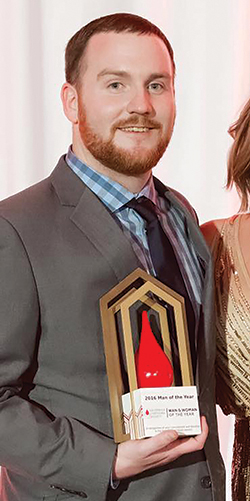Non-Hodgkin Lymphoma Survivor
The Power of a Positive Attitude
 When Danny Callahan was 27, he was on his lunch break when he learned he had blood cancer. He began treatment right away, even before getting his official diagnosis: Stage III Burkitt lymphoma, a rare and aggressive lymphoma. He has been cancer-free since June 2013, and he now helps others who receive diagnoses like his.
When Danny Callahan was 27, he was on his lunch break when he learned he had blood cancer. He began treatment right away, even before getting his official diagnosis: Stage III Burkitt lymphoma, a rare and aggressive lymphoma. He has been cancer-free since June 2013, and he now helps others who receive diagnoses like his.
In July 2012, I had strange symptoms that lasted about a month. I put on weight quickly and was so bloated that I looked pregnant. I knew something was wrong, so I went to an urgent care facility over my lunch break. They took a blood sample and immediately knew I had blood cancer. They weren’t sure of the exact diagnosis, but they were sure it was cancer. I was only 27.
The worst part of that day was telling my mom I had cancer. The facility wouldn’t release me without a family member, so I had to call her and tell her moments after I found out. It didn’t sink in for me for a few days, but telling her was awful.
I went straight to the hospital and was admitted that afternoon. My oncologist was still diagnosing exactly what blood cancer I had, but he knew it was advanced. My medical team didn’t want it to spread, so I started treatment right away. I didn’t care what I needed to do — I just wanted to do it.
Treatment turned out to be an 18-day chemotherapy regimen. Halfway through, my diagnosis was pinpointed as Stage III Burkitt lymphoma, a very rare and aggressive non-Hodgkin lymphoma. Even though it is aggressive, it is treatable and responds well to chemotherapy.
I had nine rounds of chemotherapy over six or seven months, spending between seven and 10 days in the hospital each time. Being in the hospital that long got boring, but having visitors helped a lot. The best visitors were the ones who treated me the same as they did before my diagnosis. I felt like everything was back to normal for that hour.
A friend of mine received a Burkitt lymphoma diagnosis when he was 25. This is such a rare cancer that my doctor said knowing someone else with it is like winning the Powerball. When I got my diagnosis, he was two years cancer-free and was a tremendous resource for me. Having a friend my age who had gone through the same thing was incredibly helpful. He told me which rounds of chemotherapy would be the worst and helped me mentally prepare. He was frank and warned me when it would be really bad. Even though chemotherapy wasn’t fun, knowing what to expect helped a lot.
The chemotherapy caused hair loss, fatigue, weight loss and pain. I communicated openly with my medical team members, so they could prescribe pain medication and adjust my regimen when I felt really bad.
My nurses were hugely important to me. They were such a help mentally and physically and gave me positivity. SinceI was in the hospital for seven or 10 days at a time, we got to know each other well. They made the process 10 times easier. I’ll never forget them and know we will be lifelong friends.
After chemotherapy ended, I was basically on lockdown for about a year as the doctors monitored my cancer. I had a weakened immune system, so I couldn’t work. I had to avoid crowds and wear a face mask. I felt trapped, but I learned to accept it and reminded myself it was temporary. At first I was shy about it. I was embarrassed to wear a facemask and self-conscious that I’d lost my eyebrows. My friends threw a big shave-your-head party, which made me feel better. Eventually I realized that if someone has a problem with how I look, that’s their problem, not mine.
Seeing how other people reacted to my diagnosis was the hardest part. Breaking the news wasn’t easy. I tried to calm people down and put a positive spin on it. At first, just thinking about my cancer bothered me, but other survivors helped me see the light at the end of the tunnel. From them I learned that chemotherapy was a necessary evil.
Now I’m doing fantastic. I’m almost three years cancer-free, and at this point, there’s a 99.8 percent chance the cancer won’t return. I still have stomach problems from treatment, but my hair is back, my energy is back and my checkbook is back. I try to live a healthier lifestyle. I’ve learned you should treat your body like a car — you get out of it what you put into it. You only get one body. Respect it if you want to feel good.
In May 2016, I won the Man of the Year Award from the Kansas City Leukemia and Lymphoma Society (LLS). In 10 weeks, I raised nearly $70,000 for the LLS and loved getting to use my experience to support others. The best part was how much all the award candidates raised collectively. It was incredible and humbling to see how many people continued to help me, and how that let me help others.
Don’t fight treatment. Do what your oncologist tells you. Keep fighting, and you’ll feel better and better. Being negative doesn’t affect just you; it also affects the people around you. When the people who love and support you see you losing hope, they start to lose hope, too. A positive outlook is the only attitude that will help, and it is more powerful than you know.


